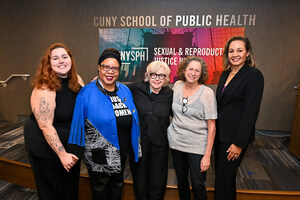CUNY SPH survey reveals factors of COVID-19 vaccine hesitancy and acceptance in the U.S.
New measurement scale offers data insights and communication strategies
NEW YORK, Nov. 5, 2021 /PRNewswire/ -- A new study of COVID-19 vaccine acceptance and hesitancy in the U.S. by researchers at the CUNY Graduate School of Public Health and Health Policy (CUNY SPH) offers strategies to accelerate vaccine usage and counter resistance among the one-in-five Americans still unwilling to take the shot.
The study, published in Nature Scientific Reports, states that while vaccine mandates are likely to be accepted, additional effective, targeted interventions to enhance these factors and increase vaccine uptake are urgently needed. It also focuses on the predictive value of COVID-VAC, a new scale for measuring vaccine acceptance.
For the study—one of the first to examine changing attitudes in the U.S. towards COVID-19 vaccine acceptance since the vaccines were made available—the researchers surveyed 6,037 adults in the four largest U.S. metropolitan areas (New York, Los Angeles, Dallas, and Chicago) and nationwide.
The study offers insights into motivating vaccine acceptance, including that those who tested positive or had a family member test positive for COVID-19 were more likely to accept vaccination. Other levers of change included the finding that a majority was in favor of vaccine mandates from employers (57.7 percent) and universities (62.3 percent). Lower income and conservative ideology, but not race, were strongly associated with vaccine unwillingness. Returning to work was a top priority expressed by conservative respondents and may be an effective motivator for this group to vaccinate.
The study found no consistent racial patterns to vaccine hesitancy. For example, in the NY and LA metropolitan areas, White respondents were more likely than Black respondents to express COVID-19 vaccine unwillingness, while the reverse was true in the Chicago and Dallas metropolitan areas.
"These findings caution against demographic generalizations and emphasize the importance of assessing local context when tailoring interventions and messaging," says CUNY SPH Dean Ayman El-Mohandes, the study's first author. "Stereotyping racial attitudes could lead to disenfranchisement of communities of color that are increasingly well-motivated to participate in vaccination programs."
A key finding was that the COVID-VAC tool can be applied to specific populations, for example vaccine hesitant and vulnerable groups, to inform and provide strategic guidance to policymakers and healthcare providers both domestically and globally.
The tool found that nationally there is agreement on key elements of trust in the vaccine:
- 84 percent of participants agreed that COVID-19 is a dangerous health threat.
- 78.3 percent agreed that COVID-19 can be prevented by vaccination.
- 74.2 percent agreed that the risks of COVID-19 are greater than the risks of the vaccine.
- 72.9 percent did trust in the science behind the vaccines.
- 69.6, a slightly lower but still solid majority, believed that COVID-19 vaccines would be distributed fairly "to everyone and everywhere."
"This study provides an in-depth understanding of perceptions underlying COVID-19 vaccine acceptance in the U.S. and describes motivational factors that could be used to sway those who are unsure or opposed to vaccination," says Dr. El-Mohandes.
Contact:
Ariana Costakes
[email protected]
SOURCE CUNY SPH

Related Links
WANT YOUR COMPANY'S NEWS FEATURED ON PRNEWSWIRE.COM?
Newsrooms &
Influencers
Digital Media
Outlets
Journalists
Opted In




Share this article